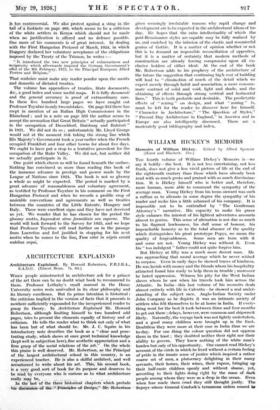WILLIAM HICKEY'S MEMOIRS
Memoirs of William Hickey. Edited by Alfred Spencer. (Hurst and Blackett. 21s.) THE fourth volunie of William Hickey's Memoirs is—we say it boldly—the best. It is not less entertaining, not less frank, does not give a less vivid picture of life at the end of the eighteenth century than those which have already been read with so much gusto and praised with so much discrimina- tion. It is Hickey himself who is better and, therefore, more human, more able to command the sympathy of the average man. Young Hickey from his teens onward was such a ruffian as to alienate in some degree the sympathy of his reader and make him a little ashamed of his company. It is impossible not to be enthralled by " The Gentleman Attorney's " narrative. His capacity to make his grave style enhance the interest of his lightest adventures amounts almost to genius. This sense of alienatiOn is not due so much to his flagrant lawlessness, his dull sense of honour, his impeachable honesty as to the total absence of the quality which distinguishes his-great prototype Pepys, we mean the quality of forgivableness. Some men are born with it and some are not. Young Hickey was without it. Even his " too indulgent " father could not quite forgive him.
But Hickey at fifty was a much more decent man. He was approaching that moral average which he never wished to surpass. Even in early days he showed traces of kindness. He was lavish with money and the friends whom his hospitality attracted found him ready to help them in trouble ; moreover he hated oppression. Witness his pity for the West Indian slaves whom he saw when his travels took him across the Atlantic, In India—this last volume of his memoirs deals almost entirely with life in Calcutta—he showed a real under- standing of the subject race. Anglo-Indian Society under John Company as he depicts it was an intimate society _of settlers who felt themselves to be at home in India. If every- thing went for the best it took between three and four months to get out there ; delays, however, were common and shipwreck likely. Naturally; the voyage back was not lightly undertaken, and a good many children were brought up in the East. Doubtless they were more at their ease in India than we are to-day. For one thing the colour question did not oppress them in the least ; they doubted neither their right nor their ability to govern. They knew nothing of the white man's burden but only of his opportunity. One cannot read Hickey's account of the circle in which-he lived without a certain feeling of pride in the innate sense of justice which inspired a rather coarse set of men, a plutocracy delighting in their many servants, their horses, their wines, their rupees, bringing up their half-caste children openly and without shame, yet, according to their lights doing right by the mass of dark people among whom they were as a drop in the ocean. Even when fear made them cruel they still thought justly. The Sepoys -whom- General-Gradock's tyrannous orders roused to revolt got more sympathy than a "society, endangered by their fury, dared express.
Manners change very much in a century and a quarter, and nothing stria the reader of these pages more strangely than the emotionalism displayed by the men. We are con- stantly hearing of people thrown off their mental balance and even dying from sorrow, shock or anxiety. True, they " never flinched from the bottle " which may account for some of their nervous depression. The fact that religion played no apparent part in their lives may also have had something to do with the prevalence of nervous despair. Spiritual matters are only alluded to very stiffly and usually in connexion with funerals, the dead person being spoken of as "joining" someone else in the tomb or else as going to enjoy the " eternal bliss " to which his good conduct " fully entitled him." The evangelical movement was soon to change the Calcutta atmosphere, but by then Hickey had pursued his adventurous way back to Europe. He left India with tears and bitter regrets, being with difficulty restrained from returning before he boarded the ship. He hated the sea, pluckily as he took its dangers. It was, he said, the smell, the- darkness of his cabin, " the horrid screeching and crying of children being sent honie for education or what is worse, their vociferous mirth when playing their gambols in the steerage," which he dreaded. After a bad passage and many adventures he got home, settled down with his sisters to life in an English village, and wrote no more.











































 Previous page
Previous page